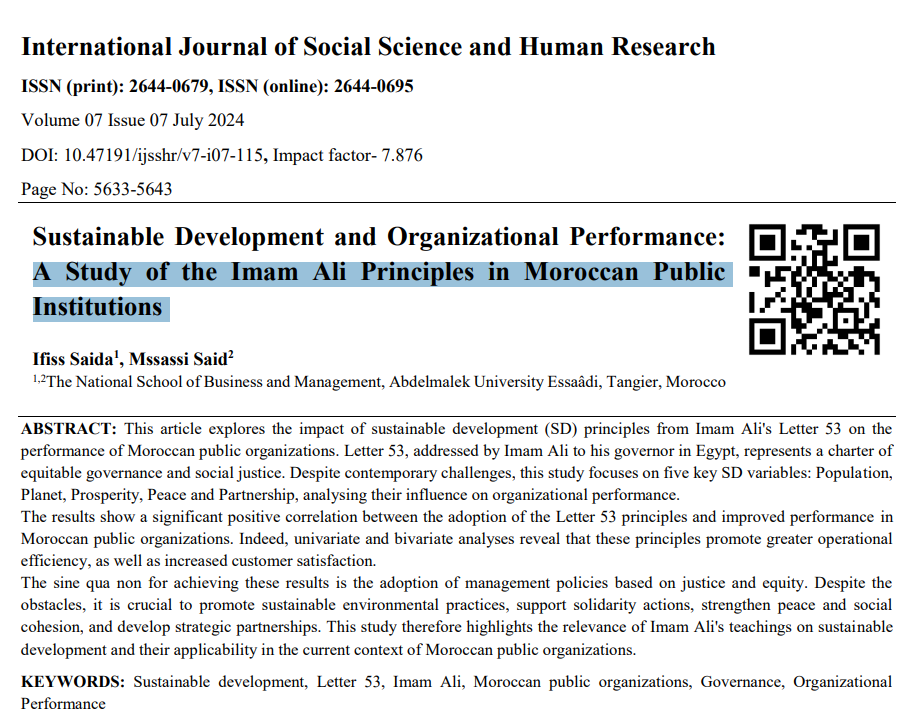This article is about how the leadership principles of Imam Ali (a.s.), especially from his famous Letter 53 to Malik al-Ashtar, can improve the performance of Moroccan public organizations when applied through the lens of sustainable development. The researchers focused on five key areas of sustainability, often called the “5 Ps”: Population, Planet, Prosperity, Peace, and Partnership. These are the same pillars highlighted in the United Nations’ Agenda 2030 for Sustainable Development.
What the article really says:
The core idea is that although Imam Ali’s letter was written over 1,300 years ago, it holds practical guidance for modern governance and sustainability. The researchers wanted to see whether following his guidance could actually make Moroccan public organizations run better and more fairly.
How the study was done:
- The authors chose 126 Moroccan public organizations, including government offices, state-owned companies, and other public bodies.
- They asked employees questions about how well their organizations performed in each of the five SD areas.
- Then they compared those answers to how satisfied the employees were with the performance of the organization overall.
- They used two kinds of statistical analysis (univariate and bivariate) to measure these relationships.
What they found:
1. Population (Employee Health and Safety):
Most employees were unhappy with how their organizations handled health and safety. But where organizations did better in this area, performance, efficiency, and customer satisfaction were also higher. This aligns with Imam Ali’s emphasis on fairness and care for all people.
2. Planet (Environmental Efforts):
There was a very strong link between organizations that cared for the environment and those that performed well. Still, most employees felt their organizations were not doing enough for the environment. Imam Ali’s teachings support responsible management of natural resources, and the study shows that doing so also improves organizational outcomes.
3. Prosperity (Helping the Poor):
Support for the underprivileged was weak in many organizations, according to staff. However, those that did engage in helping others saw better performance results. Imam Ali stressed compassion and justice for the needy, and this study shows that it also builds stronger, more respected organizations.
4. Peace (Social Harmony):
Organizations that promoted social peace, fairness, and inclusion performed better. Yet again, many employees felt their organizations lacked real efforts in this area. The research supports Imam Ali’s view that justice and harmony are necessary for a stable and productive society.
5. Partnership (Public-Private Collaboration):
Working together with other organizations and private companies also led to better results. These partnerships are more effective when they are based on transparency, fairness, and mutual benefit—values clearly promoted by Imam Ali.
Why this study matters:
The research breaks new ground because it links an ancient Islamic leadership model to modern public management and sustainable development goals. Previous models of good governance didn’t focus much on sustainability. This study fills that gap and suggests that timeless ethical leadership—like that of Imam Ali—can offer practical tools for today’s complex public institutions.
Final thoughts:
- The authors believe Moroccan public organizations should adopt more of these ethical and sustainable practices.
- Doing so can lead to better service, happier employees, and stronger public trust.
- They also recommend further studies, especially in other countries, to see if these findings apply more widely.
In short, the article shows how Islamic ethical leadership, especially from Imam Ali’s Letter 53, can guide modern institutions toward fairness, sustainability, and success. It’s a unique combination of history, ethics, and modern organizational science.
















